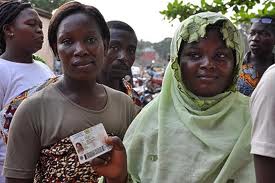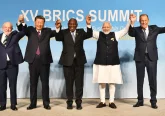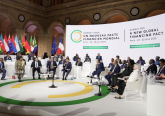 The integrity of the March 2010 Togolese presidential election was formally challenged immediately following the announcement of incumbent Faure Gnassingbé’s victory. Fortunately, the violence and massive internal displacement that marred the 2005 race were not repeated, but the opposition alleged widespread irregularities and fraud. Ultimately the result was upheld, and Gnassingbé maintained his family’s four-decade-long grip on power of this tiny West African country. One opposition candidate claimed, “The vote was so expertly stolen by the ruling party that electoral observers will never understand what really happened.”
The integrity of the March 2010 Togolese presidential election was formally challenged immediately following the announcement of incumbent Faure Gnassingbé’s victory. Fortunately, the violence and massive internal displacement that marred the 2005 race were not repeated, but the opposition alleged widespread irregularities and fraud. Ultimately the result was upheld, and Gnassingbé maintained his family’s four-decade-long grip on power of this tiny West African country. One opposition candidate claimed, “The vote was so expertly stolen by the ruling party that electoral observers will never understand what really happened.”
At least part of what really happened was actually rather simple. Erosion of electoral integrity began at least nine months before the ballots were counted. During the summer of 2009, I lived in a Lomé neighborhood that has traditionally been aligned with the opposition. One morning, the daily challenge of navigating the unpaved road-turned-river on my way to work was interrupted by the sight of hundreds of women lingering outside of a building. One woman told me the reason for the queue was, “the government knows we are poor and wants to help us.” I then watched another accept thick stacks of CFA francs from a government official in exchange for her name. According to my Togolese colleague, she would be reminded who had guaranteed that her family had been fed when she turned up at the polling station the following spring.
There are a number of things wrong with this picture, outright corruption featuring among the most obvious. The September 2012 Deepening Democracy report emphasizes the crucial role that electoral integrity plays in strengthening democracy. While truly “free and fair” elections are important, electoral integrity is not necessarily the most critical factor in addressing the democratic deficit from which developing countries, especially fragile states, suffer.
A line in the report notes, “Evidence from around the world suggests that elections with integrity matter for empowering women.” In the case of Togo, perhaps a more transparent election – an important proxy of democracy – would have allowed women greater freedom to exercise their political rights, but it wouldn’t have addressed the underlying conditions of poverty and inequality that inhibit the growth of a more democratic society outside the scope of election season. Strengthening democratic institutions like elections matters for empowering women, but causality also runs in the reverse direction. Strengthening the social and economic status for women, especially in developing countries, matters for democracy.
The importance of incorporating women into the democratic process might seem somewhat obvious, even tautological. As Michelle Bachelet, Executive Director of UN Women, argued in a speech in May 2011, “If a democracy neglects women’s participation…it is a democracy for only half its citizens.”
But a democracy without meaningful female participation is not incomplete simply because half of the population is excluded. It is the character of this participation that matters.
In the case of Togo, the government targeted women as recipients of election-related bribes for a reason. As managers of the household, women assert a crucial degree of power within the family and local community structures, including over voting decisions. But if voting decisions are inescapably dependent on calculations related to subsistence and survival, can women really be said to have meaningful political power?
On a macro-level, Togolese women suffer from systematic social and economic marginalization (see the UN Committee on the Elimination of Discrimination Against Women’s draft 2012 report on Togo). One of the most telling statistics in this regard is that the adult female literacy rate, as of 2006, is a meager 44%. If Togo and other fragile states want to strengthen democracy, empowering women – in both economic and social senses – is one of the most effective ways to do so because in a country where the economic and social institutions are weak or unequal, the political institutions will be stunted as well. To address this problem, arguably the most important place to start is female education.
Statistical evidence of this theory has gained increased traction over the past several decades. In his 1999 paper Determinants of Democracy, Harvard macroeconomist Robert Barro finds a significant relationship between more equal educational opportunity between the sexes and the “target” level of democracy (for which elections serve as a proxy). Barro concludes: “expanded educational opportunity for females goes along with social structure that is generally more participatory and, hence, more receptive to democracy.”
The World Bank has also taken this issue quite seriously. In a 2008 report, titled Girls’ Education in the 21st Century, World Bank economists argue that “educating women and girls is crucial to economic development,” especially in developing countries where the returns to investment in female education can be enormous. Statistical analysis suggest that higher rates of education among women are correlated with key social and health indicators – lower infant mortality rates, lower maternal mortality rates, fewer incidences of HIV/ AIDS infection – as well as economic indicators, especially in an inter-generational sense. Economic and social empowerment for women shrinks poverty and inequality within a society, providing more fertile ground for democracy to grow.
Reliable data is often difficult to come by, especially in fragile states. But qualitative and anecdotal evidence of the transformative power educating women and girls abounds. Nicholas Kristof and Cheryl WuDunn, in their compelling best-seller Half the Sky, provide a compelling examination of how unlocking the potential of women in impoverished countries through education has resulted in economic growth, social improvement, and progress toward democracy.
Empowering women is not a panacea, but it should be a high priority on the agendas of countries that want to take democracy seriously. Girls’ education is an excellent place to start.
Brittany Urick is an MPP student at the Blavatnik School of Government, Oxford.








No Comment